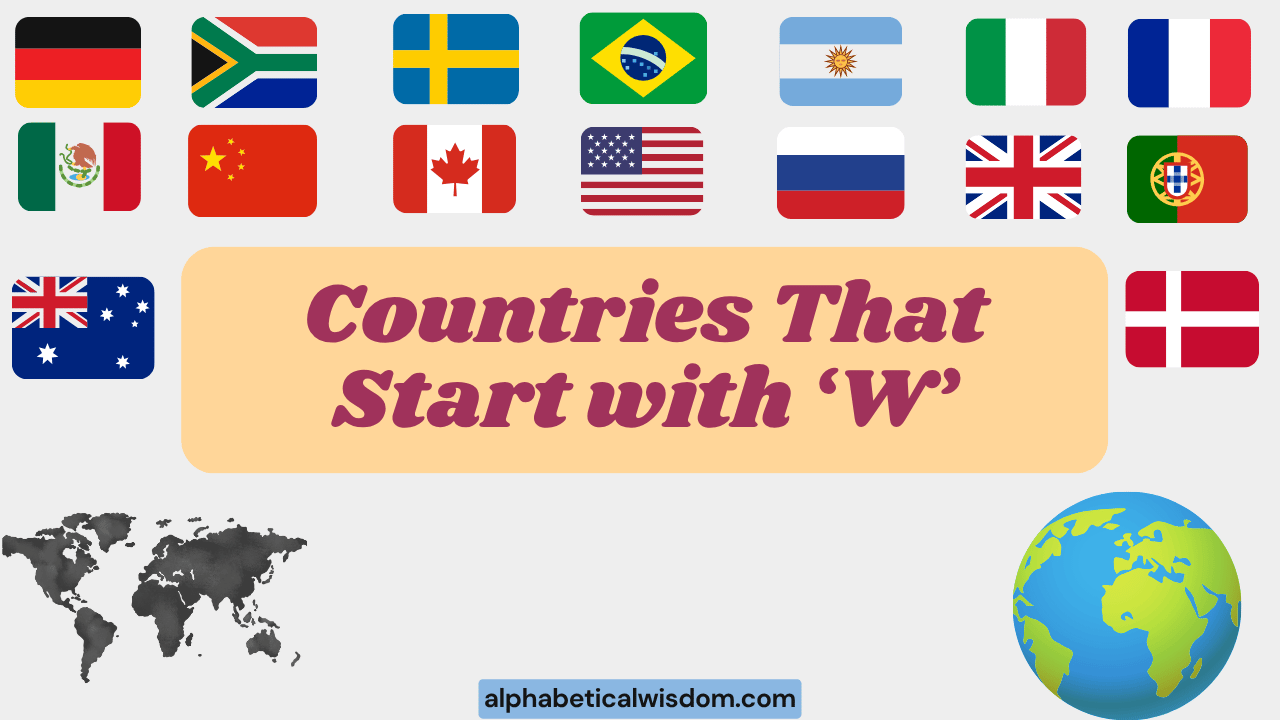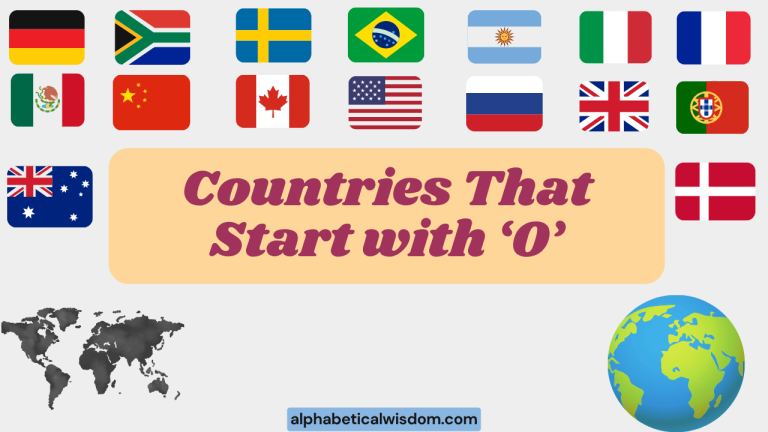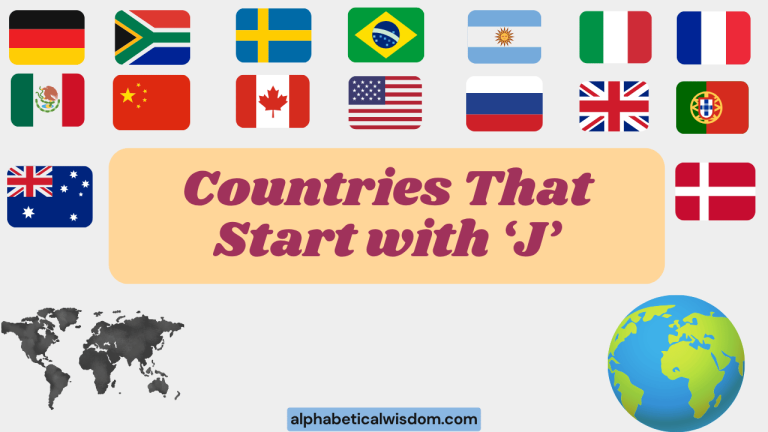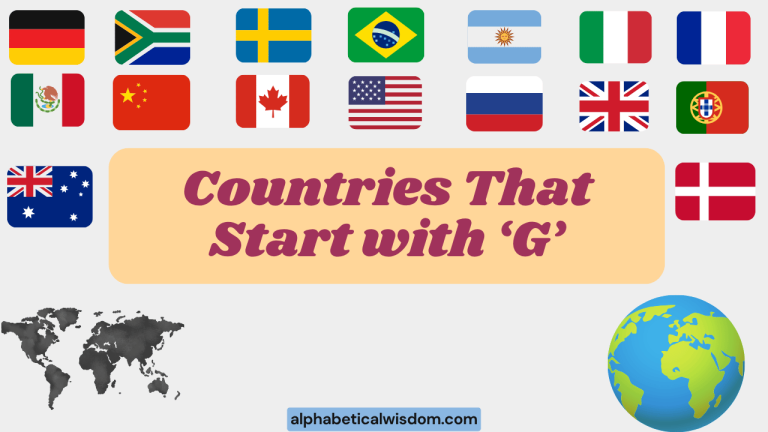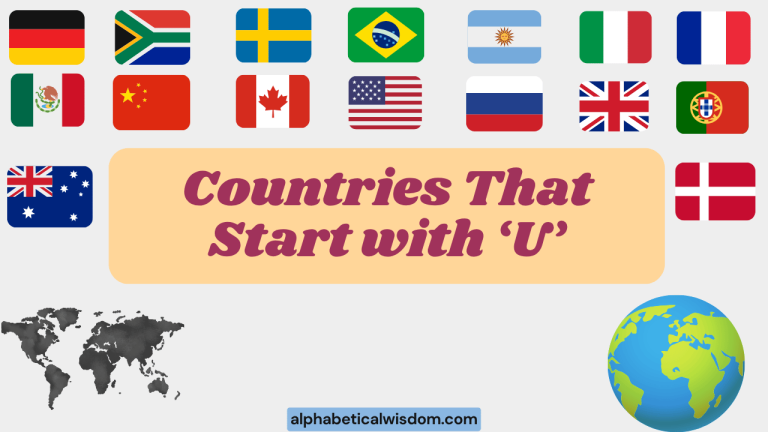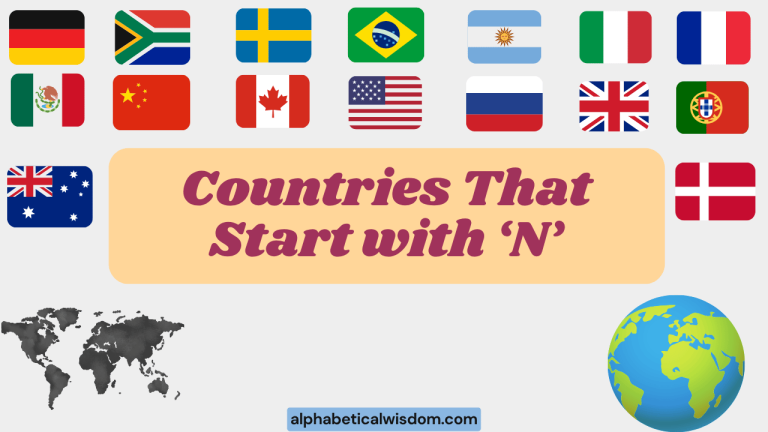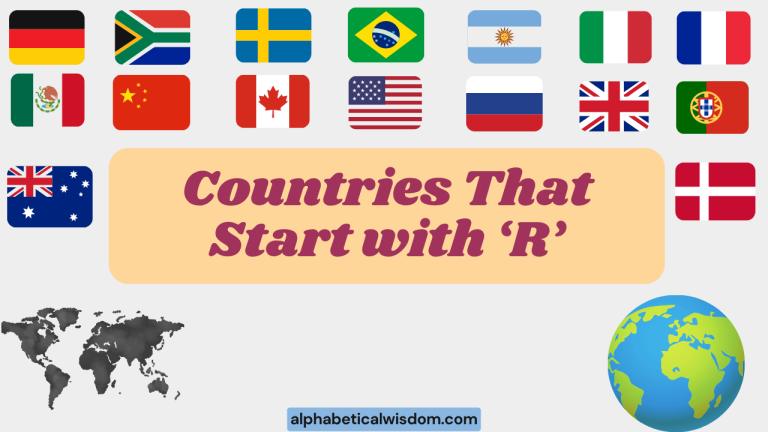Countries Starting With ‘W’: A Grammatical Guide
Understanding how to use country names correctly is a fundamental aspect of English grammar and communication. This article focuses specifically on countries whose names begin with the letter ‘W’, exploring their grammatical nuances, proper usage, and common pitfalls.
Mastering this knowledge will enhance your writing accuracy and overall fluency in English. This guide is beneficial for English language learners, educators, and anyone seeking to refine their grammatical skills and geographical knowledge.
By delving into this specific category, we can uncover valuable insights applicable to broader grammatical principles.
Table of Contents
- Introduction
- Definition: Countries Starting With ‘W’
- Structural Breakdown
- Types and Categories
- Examples
- Usage Rules
- Common Mistakes
- Practice Exercises
- Advanced Topics
- FAQ
- Conclusion
Definition: Countries Starting With ‘W’
A country is a self-governed political entity with defined borders and an internationally recognized government. Countries that start with the letter ‘W’ are specific geographical locations whose official names begin with this letter. Grammatically, these names function as proper nouns, requiring capitalization. They serve as subjects, objects, or complements within sentences. Understanding their correct usage is essential for clear and accurate communication. These nouns represent real-world places, each with its own unique history, culture, and significance.
The function of these nouns is primarily to identify and refer to specific nations. In various contexts, they can appear in geographical discussions, news reports, academic papers, and everyday conversations.
Their proper use demonstrates respect for the country and its people, as well as a command of English grammar. Furthermore, correct capitalization and spelling are crucial for maintaining credibility in written communication.
The grammatical treatment of these countries’ names does not differ from any other country.
Structural Breakdown
The structural breakdown of country names starting with ‘W’ involves understanding their role as proper nouns. Proper nouns always begin with a capital letter, regardless of their position in a sentence. These names can be modified by adjectives or appear in prepositional phrases to provide more specific information. For instance, “Western Samoa” uses an adjective to specify a region, while “the history of Wales” uses a prepositional phrase to add context. These names can also be part of compound nouns or phrases.
The grammatical structure also involves understanding how these names interact with verbs and other parts of speech. When used as the subject of a sentence, the verb must agree in number with the subject. For example, “Wales is a part of the United Kingdom.” Here, “Wales” is the singular subject, and “is” is the corresponding singular verb. Analyzing these structural elements ensures grammatical accuracy and clarity in writing. Furthermore, the structural breakdown helps identify potential errors in sentence construction.
Types and Categories
While there aren’t different “types” of countries starting with ‘W’ in a grammatical sense, we can categorize them based on geographical location, political status, or cultural characteristics. For example, Wales is a constituent country of the United Kingdom, while other potential (though currently nonexistent) examples might be independent nations.
These categorizations don’t change the grammatical rules governing their names, but they provide context for understanding their significance. These categories are useful for organizing information and understanding the relationships between different countries.
Another way to categorize them is by their historical context. Some countries may have undergone name changes or political transformations over time, impacting how they are referenced historically.
Understanding these historical nuances can add depth to your understanding of these countries. However, from a purely grammatical standpoint, the primary concern remains the correct capitalization and usage of their current official names.
The name of the country is always treated as a proper noun.
Examples
General Examples
This section provides a list of countries that begin with the letter ‘W’, serving as a reference for grammatical examples in the following sections. This list is not exhaustive but includes the most commonly known examples.
| Country |
|---|
| Wales |
The table above lists the existing country name starting with W. The sections below will provide examples of usage in different contexts.
Sentence Examples
This section provides examples of how the country name “Wales” can be used in sentences. These examples demonstrate the correct capitalization and grammatical structure.
| Sentence | Grammatical Function |
|---|---|
| Wales is known for its beautiful landscapes. | Subject |
| I visited Wales last summer. | Object of the verb “visited” |
| She is from Wales. | Object of the preposition “from” |
| The culture of Wales is rich and vibrant. | Subject |
| We drove through Wales on our road trip. | Object of the preposition “through” |
| The language spoken in Wales is Welsh and English. | Object of the preposition “in” |
| He studied the history of Wales. | Object of the preposition “of” |
| The capital of Wales is Cardiff. | Subject |
| They planned a vacation to Wales. | Object of the preposition “to” |
| The mountains in Wales are breathtaking. | Object of the preposition “in” |
| The economy of Wales is diverse. | Subject |
| The people of Wales are friendly and welcoming. | Object of the preposition “of” |
| The national symbol of Wales is the daffodil. | Subject |
| The rugby team from Wales is very competitive. | Subject |
| She learned to speak Welsh while living in Wales. | Object of the preposition “in” |
| The music of Wales is often influenced by its Celtic heritage. | Subject |
| The castles in Wales are historical landmarks. | Object of the preposition “in” |
| The coastline of Wales is rugged and beautiful. | Subject |
| The traditions of Wales are passed down through generations. | Object of the preposition “of” |
| The industries in Wales include tourism and agriculture. | Object of the preposition “in” |
| The flag of Wales features a red dragon. | Subject |
| The government of Wales manages local affairs. | Subject |
| The landscape of Wales is perfect for hiking. | Subject |
| The wildlife in Wales is protected by conservation efforts. | Object of the preposition “in” |
| The education system in Wales includes both Welsh and English medium schools. | Object of the preposition “in” |
| The arts scene in Wales is thriving. | Object of the preposition “in” |
| The history of Wales is marked by resilience and cultural preservation. | Subject |
| The food in Wales includes traditional dishes like Welsh rarebit. | Object of the preposition “in” |
The table above provides a comprehensive list of sentences demonstrating the use of “Wales” in various grammatical contexts. Analyzing these examples helps understand how the country name functions within different sentence structures.
Conversational Examples
This section provides examples of how “Wales” might be used in everyday conversations. These examples illustrate the informal and natural usage of the country name.
| Conversation |
|---|
| “Have you ever been to Wales?” “No, but I’d love to go!” |
| “My friend is from Wales.” “Oh, really? What’s it like there?” |
| “I’m thinking of visiting Wales next year.” “You should! It’s beautiful.” |
| “Did you see the Wales rugby game?” “Yes, it was amazing!” |
| “I heard they speak Welsh in Wales.” “That’s right, along with English.” |
| “What’s the capital of Wales?” “It’s Cardiff.” |
| “I’m learning about the history of Wales.” “That’s interesting! It’s a fascinating place.” |
| “My family has roots in Wales.” “That’s cool! What part?” |
| “I love the scenery in Wales.” “Me too! The mountains are incredible.” |
| “Have you tried Welsh food?” “No, what’s it like?” |
| “I’m planning a hiking trip in Wales.” “That sounds amazing! Enjoy!” |
| “I met someone from Wales at the conference.” “Oh, how interesting!” |
| “I’m reading a book about Wales.” “What’s it about?” |
| “Wales is known for its castles.” “Yes, they’re very impressive.” |
| “I want to visit the coast of Wales.” “It’s stunning! You won’t regret it.” |
| “I’m interested in learning Welsh.” “That’s great! It’s a beautiful language.” |
| “Wales has a rich cultural heritage.” “Yes, it does!” |
| “I’m going to a music festival in Wales.” “That sounds like fun!” |
| “I’m studying abroad in Wales.” “That’s an amazing opportunity!” |
| “Wales is a part of the UK.” “Yes, it is.” |
| “I prefer the climate in Wales.” “Really? Why?” |
| “Wales is a very green country.” “That’s true.” |
| “I bought a souvenir from Wales.” “What did you get?” |
| “Wales is sometimes overlooked.” “Yes, but it’s a hidden gem.” |
| “I am traveling to Wales next week.” “Have a safe trip!” |
The table above provides conversational examples using “Wales”. These demonstrate how the name is naturally integrated into everyday dialogues.
Formal Writing Examples
This section provides examples of how “Wales” might be used in formal writing, such as academic papers or official reports. These examples emphasize precision and adherence to grammatical conventions.
| Formal Writing |
|---|
| “The economic impact of tourism in Wales has been significant in recent years.” |
| “Historical records indicate that Wales has a long and complex relationship with England.” |
| “The government of Wales has implemented new policies to promote sustainable development.” |
| “Research suggests that the Welsh language is experiencing a resurgence in Wales.” |
| “The geographical features of Wales have played a crucial role in its cultural identity.” |
| “The study examines the influence of Celtic traditions on the art and literature of Wales.” |
| “The report analyzes the demographic trends in Wales over the past decade.” |
| “The conference will address the challenges and opportunities facing Wales in the 21st century.” |
| “The article explores the political landscape of Wales and its relationship with the United Kingdom.” |
| “The research project aims to document the oral history of Wales.” |
| “The data indicates a growing interest in Welsh culture and heritage within Wales.” |
| “The analysis focuses on the impact of globalization on the economy of Wales.” |
| “The study investigates the effectiveness of environmental policies in Wales.” |
| “The report provides an overview of the healthcare system in Wales.” |
| “The committee will review the educational standards in Wales.” |
| “The survey assesses the quality of life in Wales.” |
| “The investigation examines the historical preservation efforts in Wales.” |
| “The assessment evaluates the infrastructure development in Wales.” |
| “The document outlines the strategic plan for economic growth in Wales.” |
| “The review analyzes the tourism industry in Wales.” |
| “The presentation will cover the cultural significance of Wales.” |
| “The paper discusses the linguistic diversity in Wales.” |
| “The exploration examines the environmental challenges in Wales.” |
| “The summary details the agricultural practices in Wales.” |
| “The commentary reflects on the social changes in Wales.” |
The table above presents examples of how “Wales” can be used in formal writing contexts. These examples emphasize precision and adherence to grammatical conventions, essential for academic and professional settings.
Geographical Context Examples
This section provides examples of how “Wales” is used when discussing geographical features or regions. These examples demonstrate the correct usage of geographical terms and their relationship to the country name.
| Geographical Description |
|---|
| “Snowdonia National Park is located in Wales.” |
| “The coastline of Wales is characterized by rugged cliffs and sandy beaches.” |
| “The Brecon Beacons are a mountain range in South Wales.” |
| “The River Wye flows through Wales and England.” |
| “The island of Anglesey is located off the coast of North Wales.” |
| “Cardiff, the capital of Wales, is situated on the Bristol Channel.” |
| “The Cambrian Mountains run through the center of Wales.” |
| “The Gower Peninsula is a popular tourist destination in South Wales.” |
| “The Vale of Glamorgan is a fertile agricultural region in Wales.” |
| “The Snowdon mountain is the highest peak in Wales.” |
| “The Pembrokeshire Coast National Park protects a significant portion of the Welsh coastline.” |
| “The Dee Estuary is an important habitat for wildlife in North Wales.” |
| “The Clwydian Range is a series of hills in North East Wales.” |
| “The Llyn Peninsula is a scenic region in North West Wales.” |
| “The Afan Forest Park is a popular destination for mountain biking in South Wales.” |
| “The Elan Valley is a series of reservoirs and dams in Mid Wales.” |
| “The Wye Valley is a designated Area of Outstanding Natural Beauty in Wales and England.” |
| “The Great Orme is a limestone headland near Llandudno in North Wales.” |
| “The Black Mountains are a range of hills in South East Wales.” |
| “The Menai Strait separates the island of Anglesey from mainland Wales.” |
| “The Taff Trail is a popular walking and cycling route in South Wales.” |
| “The Swansea Bay coastline stretches along the south coast of Wales.” |
| “The Preseli Hills are known for their standing stones in West Wales.” |
| “The Brecon Canal is a historic waterway in South Wales.” |
| “The Dyfi National Nature Reserve is located in Mid Wales.” |
The table above demonstrates the correct usage of “Wales” in geographical contexts, highlighting its relationship to various regions and features within the country.
Usage Rules
The primary rule for using country names starting with ‘W’ is to capitalize them. This rule applies regardless of the context in which the name appears. Additionally, pay attention to articles (the, a, an) and prepositions (in, to, from) that may precede or follow the name. For example, “I am going to Wales” is correct, while “I am going Wales” is incorrect. When used as an adjective, the name usually remains capitalized, such as “Welsh culture”.
Another important rule is to use the correct spelling. While this might seem obvious, it’s crucial to double-check the spelling, especially in formal writing.
Furthermore, be aware of any specific grammatical conventions associated with the country’s name, such as its use in compound nouns or phrases. Consistency in capitalization and spelling is essential for maintaining a professional and credible tone.
The correct usage of articles and prepositions guarantees clarity and grammatical accuracy.
Common Mistakes
One common mistake is forgetting to capitalize the country name. For example, writing “I visited wales” is incorrect; it should be “I visited Wales.” Another mistake is using the wrong preposition.
For example, saying “I am from to Wales” is incorrect; it should be “I am from Wales.” Incorrect spelling is also a frequent error. Always double-check the spelling, especially if you are unsure.
Finally, using lowercase for proper adjectives derived from the country name is also incorrect.
| Incorrect | Correct |
|---|---|
| i went to wales. | I went to Wales. |
| She is from to Wales. | She is from Wales. |
| The welsh culture is amazing. | The Welsh culture is amazing. |
The table above highlights common mistakes made when using the country name “Wales”. Recognizing these errors and understanding their corrections will help you improve your grammatical accuracy.
Practice Exercises
Exercise 1: Fill in the Blanks
Fill in the blanks with the correct country name or a related adjective.
| Question | Answer |
|---|---|
| The capital of _______ is Cardiff. | Wales |
| _______ culture is rich and vibrant. | Welsh |
| She is _______, meaning she comes from _______. | Welsh, Wales |
| I am planning a trip to _______. | Wales |
| _______ is a country in the United Kingdom. | Wales |
| The language spoken in _______ is Welsh. | Wales |
| He studied the history of _______. | Wales |
| The mountains in _______ are breathtaking. | Wales |
| The people of _______ are friendly. | Wales |
| The flag of _______ features a red dragon. | Wales |
Exercise 2: Correct the Errors
Identify and correct the errors in the following sentences.
| Incorrect Sentence | Correct Sentence |
|---|---|
| i am from wales. | I am from Wales. |
| she visited wales last year. | She visited Wales last year. |
| the welsh language is beautiful. | The Welsh language is beautiful. |
| he is going to wales next week. | He is going to Wales next week. |
| they are studying the history of wales. | They are studying the history of Wales. |
| the capital of wales is cardiff. | The capital of Wales is Cardiff. |
| she is welsh, meaning she is from wales. | She is Welsh, meaning she is from Wales. |
| he loves the scenery in wales. | He loves the scenery in Wales. |
| the mountains of wales are very high. | The mountains of Wales are very high. |
| the traditions of wales are old. | The traditions of Wales are old. |
Exercise 3: Sentence Construction
Construct sentences using the given words related to countries starting with ‘W’.
| Words | Example Sentence |
|---|---|
| Wales, beautiful, is | Wales is beautiful. |
| visit, I, Wales, to | I want to visit Wales. |
| Welsh, she, speaks | She speaks Welsh. |
| Cardiff, capital, Wales, of, the, is | Cardiff is the capital of Wales. |
| Wales, history, interesting, has, an | Wales has an interesting history. |
| mountains, in, are, high, Wales, the | The mountains in Wales are high. |
| Welsh, culture, rich, is, the | The Welsh culture is rich. |
| from, is, she, Wales | She is from Wales. |
| dragon, flag, the, Wales, on, of, is, a | There is a dragon on the flag of Wales. |
| Wales, known, castles, for, is | Wales is known for castles. |
Advanced Topics
For advanced learners, exploring the etymology of the country name can provide deeper insight. Understanding the historical context and linguistic origins can enhance appreciation for the language.
Additionally, researching the cultural significance of the country and its people can broaden your knowledge. Analyzing literature and media from the country can also improve your understanding of its cultural nuances.
Exploring the political and economic systems will further enrich your knowledge. Finally, studying the geographical features and their impact on the country’s development can deepen your understanding.
Another advanced topic involves understanding the nuances of regional dialects and accents within the country. This requires listening to native speakers and studying linguistic variations.
Furthermore, exploring the historical evolution of the language and its relationship to other languages can be a fascinating area of study. Advanced learners can also delve into the sociolinguistic aspects of language use, such as how language reflects social identities and power dynamics.
Studying the impact of globalization and technology on the language can also provide valuable insights. Finally, engaging in cross-cultural communication and reflecting on your own biases and assumptions can enhance your intercultural competence.
FAQ
- Why is it important to capitalize country names?
Capitalizing country names is essential because they are proper nouns. Proper nouns identify specific people, places, or things and require capitalization to distinguish them from common nouns. Correct capitalization demonstrates respect for the country and its people, as well as attention to grammatical detail. It also ensures clarity and avoids confusion in written communication.
- What is the grammatical function of a country name in a sentence?
A country name can function as a subject, object, or complement in a sentence. As a subject, it performs the action of the verb (e.g., “Wales is beautiful”). As an object, it receives the action of the verb or follows a preposition (e.g., “I visited Wales,” “I am from Wales”). As a complement, it renames or describes the subject (e.g., “Cardiff is the capital of Wales”).
- Are there any exceptions to the capitalization rule for country names?
There are generally no exceptions to the capitalization rule for country names. However, there might be variations in how a country name is used in compound nouns or phrases. In such cases, the capitalization rule still applies to the country name itself. For example, “Welsh culture” maintains the capitalization of “Welsh” as it is derived from the proper noun “Wales.”
- How do I know which preposition to use with a country name?
The choice of preposition depends on the context of the sentence. “In” is used to indicate location or containment (e.g., “I live in Wales”). “To” is used to indicate direction or destination (e.g., “I am going to Wales”). “From” is used to indicate origin or source (e.g., “I am from Wales”). Learning common prepositional phrases will help you choose the correct preposition.
- What should I do if I’m unsure about the spelling of a country name?
If you are unsure about the spelling of a country name, consult a dictionary or online encyclopedia. Double-checking the spelling is crucial for maintaining accuracy and credibility in written communication. Additionally, pay attention to any diacritical marks or special characters that may be part of the country name.
- Can a country name be used as an adjective?
Yes, a country name can be used as an adjective to describe something related to that country. In such cases, the adjective is typically formed by adding a suffix to the country name (e.g., “Welsh culture”). The adjective remains capitalized as it is derived from a proper noun.
- Why is it important to learn about different countries?
Learning about different countries broadens your knowledge and understanding of the world. It promotes cultural awareness, enhances communication skills, and fosters global citizenship. Understanding different cultures and perspectives can also help you appreciate diversity and build stronger relationships with people from different backgrounds.
- How can I improve my knowledge of geography and country names?
There are many ways to improve your knowledge of geography and country names. You can read books, articles, and online resources about different countries. You can also watch documentaries, travel shows, and news reports about global events. Additionally, you can use interactive maps, quizzes, and games to test your knowledge and learn new information.
Conclusion
Mastering the grammatical rules for countries starting with ‘W’, like Wales, is a valuable skill for anyone learning or using the English language. Understanding that country names are proper nouns requiring capitalization is fundamental.
Consistent application of these rules enhances clarity and professionalism in writing. By avoiding common mistakes and practicing correct usage, you can improve your overall fluency and accuracy.
Remember to always double-check your spelling and grammar, especially in formal contexts. With consistent effort and attention to detail, you can confidently use country names in your writing and conversations.
This guide has provided a comprehensive overview of the grammatical considerations for using country names starting with ‘W’. By understanding the definitions, structural breakdowns, usage rules, and common mistakes, you are well-equipped to communicate effectively and accurately.
Continue practicing with the exercises provided and explore additional resources to further enhance your knowledge. Remember, language learning is a continuous process, and every effort you make will contribute to your overall proficiency.
Keep exploring, keep practicing, and keep learning!
